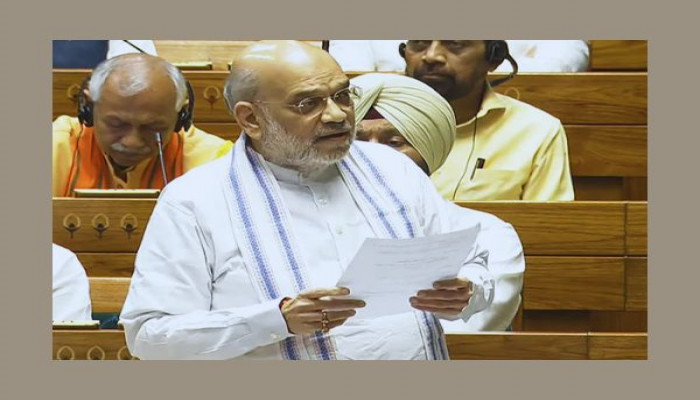Amit Shah accuses West Bengal government of allowing illegal immigration from Bangladesh
- In Reports
- 12:27 PM, Mar 29, 2025
- Myind Staff
Home Minister Amit Shah, while addressing Parliament on the Immigration and Foreigners Bill, accused the West Bengal government of enabling illegal migration from Bangladesh. Shah alleged that infiltrators from Bangladesh enter West Bengal, acquire Aadhaar and Voter ID cards, and then move to Delhi and other cities across India. He criticised the Trinamool Congress (TMC) government, led by Chief Minister Mamata Banerjee, for obstructing the completion of border fencing.
According to Shah, while 75% of the India-Bangladesh border fencing is complete, work on the remaining 25% is stalled due to the West Bengal government's refusal to provide land for construction.
Amit Shah emphasised that India cannot be a "dharmshala" where anyone can enter at will. He also addressed the issue of Tamil refugees from Sri Lanka, stating that the Centre is following the same policy as the previous United Progressive Alliance (UPA) government. According to Shah, illegal immigration is now a global problem, citing former US President Donald Trump's strict stance on the issue and the deportation of illegal immigrants from the United States.
Shah detailed India's legal framework for managing foreigners and immigration, which currently operates under four laws: the Passport (Entry into India) Act, 1920; the Registration of Foreigners Act, 1939; the Foreigners Act, 1946; and the Immigration (Carriers' Liability) Act, 2000. He asserted that the proposed new legislation would replace these outdated laws and make it more difficult for foreigners to settle illegally in India. Under the new law, illegal migrants could face imprisonment from two to seven years and fines ranging from ₹1 lakh to ₹10 lakh. The strict measures, according to Shah, have triggered opposition from Mamata Banerjee. He also accused her government of facilitating the process through which illegal immigrants obtain official identification documents.
Protests Over Waqf Amendment Bill Gain Momentum
Simultaneously, protests erupted across India against the proposed Waqf Amendment Bill. Several Muslim organisations, including the All India Muslim Personal Law Board (AIMPLB), Jamiat Ulama-e-Hind, and Jamaat-e-Islami, have mobilised opposition against the bill.
In multiple cities, Muslim worshippers wore black armbands during the Alvida Namaaz, marking the end of Ramadan, as a form of protest. In Bihar and Andhra Pradesh, Muslim leaders boycotted iftar parties hosted by Chief Ministers Nitish Kumar and Chandrababu Naidu.
The issue has also led to political friction. The ruling Dravida Munnetra Kazhagam (DMK)-led government in Tamil Nadu passed a resolution in the state assembly opposing the bill. Muslim leaders argue that the bill is an attempt by the government to seize control of mosques and graveyards. However, those backing the bill insist that no such provisions exist. Critics claim that political parties are using the bill to exploit religious sentiments for electoral gains. Muslim leaders are reportedly pressuring Nitish Kumar and Chandrababu Naidu over their stance on the bill. However, so far, efforts to rally the economically weaker Muslim population against the bill have not gained significant traction.
Supreme Court Faces Challenges in Judiciary Corruption Case
Meanwhile, the Supreme Court refused to entertain a Public Interest Litigation (PIL) seeking the registration of a First Information Report (FIR) over the recovery of large sums of cash from the residence of Delhi High Court judge Justice Yashwant Varma. A bench comprising Justices Abhay S. Oka and Ujjal Bhuyan deemed the PIL premature, stating that it could not intervene at this stage. The court emphasised that if an internal inquiry panel finds Justice Varma guilty, the Chief Justice of India (CJI) would have the authority to direct the registration of an FIR or refer the matter to Parliament.
Chief Justice Sanjiv Khanna also met with representatives of six high court bar associations, including the Allahabad High Court Bar Association (AHCBA), which has objected to Justice Varma’s transfer to the Allahabad High Court. The Supreme Court-appointed inquiry panel has recorded statements, including from the Delhi Fire Service chief, regarding the incident.
In accordance with panel directives, forensic examinations are being conducted on the mobile phones of eight police officers from Tughlak Road police station who were present at the scene when the cash was discovered. Justice Varma’s legal representatives have appeared before the panel to present his defense.
The Supreme Court faces multiple challenges in handling this case. It must maintain public trust in the judiciary by ensuring a transparent and fair investigation while simultaneously upholding judicial independence. Political pressure has also mounted, with some leaders in Parliament calling for the case to be referred to the Lokpal. Additionally, discussions about reviving the National Judicial Appointments Commission (NJAC) Bill in a modified form have resurfaced.
The Supreme Court also faces backlash from the Allahabad High Court Bar Association, which has gone on strike, questioning why a judge under investigation should be transferred to his parent court. Balancing these competing pressures while maintaining the credibility of the judiciary is proving to be a formidable task for the Supreme Court.







Comments